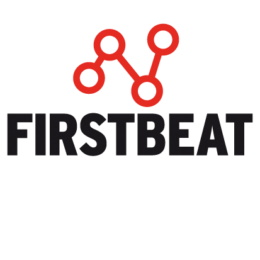
“I was speaking to Firstbeat and casually mentioned my wife was pregnant. Almost as a joke, we talked about doing the assessment during the labor…We went into labor the following week and the Lifestyle Assessment device got delivered that morning.”
Ben Scott is a former professional cricketer turned corporate wellness expert. Earlier this year, he and his wife, Nina, had their first child.
Welcoming a newborn baby into the world is one of the most incredible things you can do. But the labor itself can also be one of the most stressful.
Using the Firstbeat Lifestyle Assessment, Ben was able to see just how this major life event impacted him physiologically and how, with a little help from Will Smith, he was able to build in recovery to what was a hectic four days.
“We actually had quite a complicated labor,” explains Scott, who also uses the heart rate variability-based Lifestyle Assessment in his work combatting stress and anxiety in the corporate space with his company, Ben Scott Fitness.
“There was a point that Jaya, the baby, was battling to come out and that was obviously affecting me. And then, once she was born, it was about caring for my wife who required surgery. So, it really was a case of emotions running riot.
“We were in and out of hospital for four days. The first day isn’t included in the Assessment period but it was awful. That night was a very, very bad night’s sleep.”
Normal routine out the window
Good sleep is essential for effective recovery. It is when the body recharges and replenish resources needed for the day ahead. Not enough good quality sleep can leave you feeling exhausted, unable to focus and struggling to complete everyday tasks. As you might have guessed, the turbulent nature of childbirth means Ben said goodbye to his normal sleep routine.
For instance, Ben only logged 2 hours 30 minutes of sleep on measurement Day 3 – the day Jaya was born – and he only started sleeping at 4am (see image below). This meant that, although both the amount and quality of recovery that took place during sleep was good, it just wasn’t enough to replenish the body’s resources sufficiently after a stressful day.
Unsurprisingly, Ben self-reported that sleep as very poor. In fact, he did the same for each of the three nights.
Crucial Day 2
However, the Firstbeat Lifestyle Assessment data actually revealed that he had achieved far more recovery than he thought throughout the measurement. Particularly on the night of Day 2.
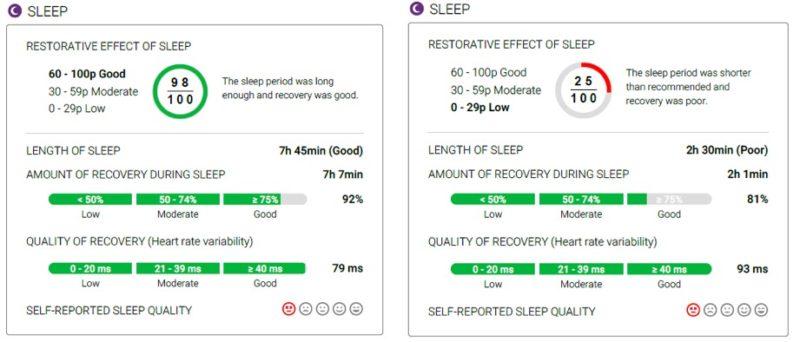
Sleep results for Day 2 (left) and Day 3 (right). Although day 3 did see good quality and amount of recovery during sleep, because there was only 2 hours 30 minutes of sleep, the restorative effect was low. Conversely, Day 2 saw good length of sleep coupled with amount and quality of recovery.
In general, it was his ability to recover in the moments of calm across the whole process that surprised Ben the most.
“I always knew I was going to go through a high stress response,” he says. “But the big learning point for me was around recovery.
“If you look at Day 2, my recovery balance was fantastic. My sleep showed that it was really good as well which surprised me. But when I thought about the labor again, I realized I didn’t feel completely stressed throughout the whole situation. A lot of the time was spent with me trying to help my wife to relax and, obviously, that led to me relaxing. I mean, we watched 26 episodes of Fresh Prince of Belair over 4 days.”
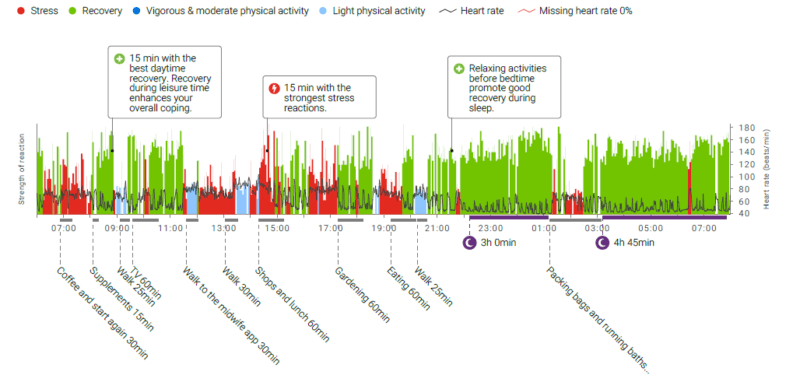
The full Day 2 graph shows Ben was able to achieve good recovery even if he didn’t feel it at the time. Scheduling in specific moments of recovery for both he and his wife such as watching TV or walking together in the garden between contractions made this possible.
These moments of daytime and overnight recovery helped to balance out the moments of stress and ensure Ben could perform his role as father and husband effectively without crashing from physical and mental exhaustion.
So, when it came to Day 3, his body had recharged enough to deal with everything from the drive to the hospital and being told about complications to his wife going in for surgery for the birth – even though his heart rate was “nearly off the charts” as he waited in a chair as Nina went in for a semi-emergency C-section.
“The feedback showed that I would have actually been on an upward trend in terms of energy levels over the three days (not taking into account the impact of the last night’s poor sleep) whereas I would have assumed it would have reduced. But, looking at my three-day report, you can see that if my middle day wasn’t there it would have really battered me.”
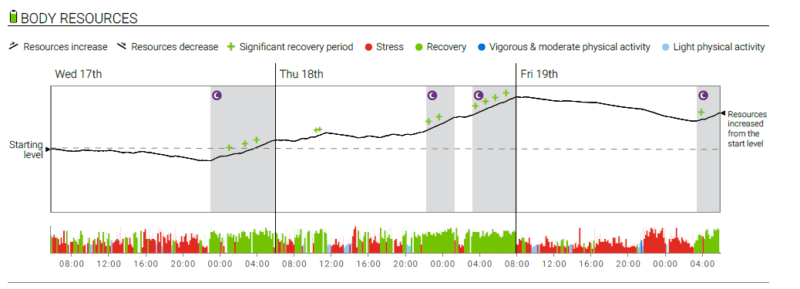
The Body Resources table in the Firstbeat Lifestyle Assessment Feedback Report shows how Ben’s resources increased and decreased throughout the measurement – and how periods of stress, recovery and physical activity impacted this.
Making sense of the data
Feedback from a Firstbeat specialist – a service provided to all Firstbeat Lifestyle Assessment users to pinpoint the key takeaways from the data – led Ben to put this ability to recover in even the most stressful of situations down to a couple of things.
“The feedback was brilliant. It was nice to have an answer that I hadn’t necessarily thought of. The Firstbeat coach talked about me taking control of the situation as a reason why I was able to recover. Obviously, whilst my wife was having contractions etc., you’ve got zero control over that. But I was doing things like counting to eight and helping with her breathing etc. so I was taking some control of the situation which I think helped.
“Also, we picked up that my resting heart rate was quite low across the whole measurement. This was put down to being in fairly good shape. Had I gone into it with a higher heart rate and not particularly fit I’m sure I’d have seen totally different results.”
Striking a balance between stress and recovery is talked about a lot in everyday life. And Ben’s Firstbeat Lifestyle Assessment results show that it is possible to some degree even in the most stressful of situations.
Thankfully, a few months into their new life as a family, father, mother and baby are all fit, healthy and, hopefully, relaxed.
See what kind of information Firstbeat Lifestyle Assessment can provide about your days!
If you liked this article, you should subscribe to our newsletter.
You might also be interested in
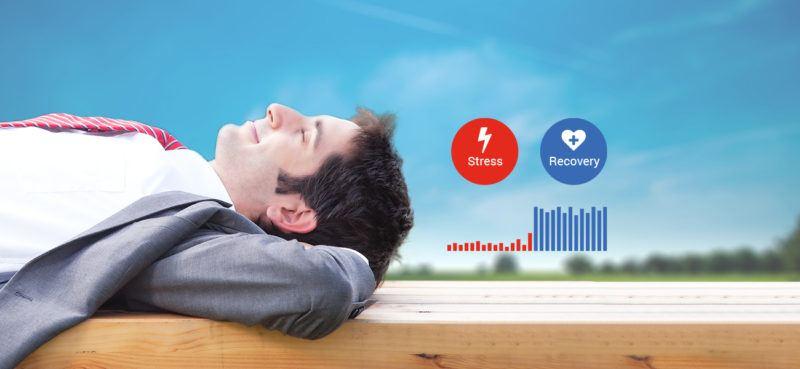
At the Heart of Stress and Recovery
Stress can be defined as a situation where the demands that a person is faced with are greater than the available resources. Stress can also be described as the body’s physical and mental adaptation to real or perceived change.

The Supercompensation of Life – How to Balance Load and Recovery
In this webinar, Firstbeat Exercise Physiologist, Tiina Hoffman, will discuss what supercompensation of life means and how lifestyle choices can impact health and performance.

Reflections on Sleep: Keeping Things in Perspective & Moving Towards A Better Snooze
Sleep is hugely important for good health and performance. It’s a key cornerstone of wellness that needs to be taken seriously both at societal and individual level.
